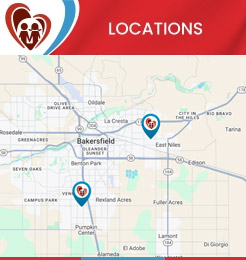Pediatric Abdominal Pain Treatment at Niles Children’s Clinic, and Wible Family Medicine in Bakersfield, CA
Pediatric abdominal pain can range from mild discomfort to signs of a more serious condition, requiring careful evaluation. Our team specializes in diagnosing and treating various causes of abdominal pain in children, including gastrointestinal infections, food intolerances, and more. We provide personalized care to ensure your child receives the right treatment for a speedy recovery. For more information, contact us today or book an appointment online. We are conveniently located at Niles Children’s Clinic, and Wible Family Medicine in Bakersfield, CA.


Table of Contents:
What causes abdominal pain in children?
How do I know if my child’s abdominal pain is serious?
When should I seek medical attention for my child’s abdominal pain?
What are the common symptoms of abdominal pain in children?
Abdominal pain in children can be concerning for both parents and kids, as it may stem from various causes, ranging from mild to more serious conditions. Gastrointestinal infections caused by viruses, bacteria, or parasites are common culprits and typically present with diarrhea, vomiting, and fever. Treatment often includes supportive care and medication to alleviate symptoms.
Constipation is another frequent issue that leads to abdominal discomfort, with pain and bloating as common symptoms. Dietary changes and, if necessary, medical treatments can help restore regular bowel movements. Food-related issues, such as lactose intolerance or food allergies, can also trigger abdominal pain, requiring dietary adjustments and sometimes testing to identify triggers.
Stress and anxiety can contribute to physical symptoms like abdominal pain in children, so addressing emotional well-being is an important part of treatment. In rare cases, serious conditions such as appendicitis or intussusception may be the cause, requiring prompt surgical intervention. We also consider less common causes, like urinary tract infections, kidney stones, or gynecological issues in adolescent girls, ensuring a comprehensive approach to diagnosis.
A thorough evaluation of symptoms, pain duration, and any associated signs such as fever or changes in bowel habits is essential for determining the cause. Early intervention is crucial for effective treatment, and seeking medical advice promptly can provide peace of mind for both parents and children.
Abdominal pain in children can vary from mild discomfort to severe distress, often causing concern for parents. It’s important to recognize when this pain may signal a more serious condition. Severe, persistent pain, especially in the lower right abdomen, may indicate appendicitis, requiring immediate evaluation. If the pain lasts more than 24 hours without improvement, it’s best to consult a healthcare provider.
Accompanying symptoms such as fever, vomiting (especially green or bloody), diarrhea, constipation, bloating, or a swollen abdomen can suggest a more serious issue. Dehydration, marked by dry mouth, decreased urination, or lethargy, often accompanies vomiting or diarrhea and should be addressed promptly. Behavioral changes like irritability, lethargy, or reluctance to move may also signal a red flag.
Monitoring these indicators closely is key to determining when to seek medical attention. Early intervention can prevent complications and provide peace of mind for parents. Comprehensive evaluation and treatment plans tailored to each child’s needs are essential for effective care, ensuring both the cause of the pain and any related symptoms are addressed.
If your child experiences abdominal pain with any concerning symptoms, trust your instincts as a parent and seek medical advice. Prompt diagnosis and treatment can help alleviate discomfort and ensure your child’s health and well-being.
When deciding whether to seek medical attention for your child’s abdominal pain, it’s important to assess the severity, duration, and accompanying symptoms. Severe or persistent pain, especially localized in the lower right abdomen, could indicate appendicitis, which requires immediate evaluation.
If the pain is accompanied by symptoms such as fever, vomiting, diarrhea, or blood in the stool, it may suggest an underlying infection or gastrointestinal issue. Vomiting of green or yellow fluid, or a visibly swollen, tender, or hard abdomen could indicate a more serious condition like an intestinal obstruction. These symptoms warrant prompt medical attention.
Behavioral changes, such as unusual lethargy, irritability, or refusal to eat or drink, are also signs that medical evaluation may be needed. Dehydration is a major concern, especially if vomiting or diarrhea prevents fluid retention.
Consider any recent injuries to the abdomen, as they may result in internal damage requiring urgent care. If your child has a pre-existing condition or is taking medication affecting their digestive system, it’s advisable to consult a healthcare professional.
Ultimately, trust your instincts as a parent. If you’re concerned about your child’s abdominal pain or if their symptoms persist despite home care, don’t hesitate to seek medical advice. A thorough assessment can help determine the cause of the pain and ensure your child receives appropriate treatment.
Abdominal pain in children is a significant concern for parents, given its wide range of potential causes. Children often experience generalized stomach discomfort or cramping, along with symptoms like nausea, vomiting, and loss of appetite. Gastrointestinal infections, food intolerances, or constipation can contribute to discomfort, bloating, and diarrhea.
Behavioral changes, such as irritability or reluctance to engage in activities, are common signs that a child is in pain. Accompanying fever may indicate infection or inflammation. In cases of localized pain, such as the lower right abdomen, conditions like appendicitis need to be considered.
A careful evaluation of the nature of the pain—whether it’s persistent or recurrent—is essential, as well as its impact on daily activities and sleep patterns. Children experiencing severe or ongoing abdominal pain should be assessed by a healthcare professional, especially when additional symptoms like vomiting or swelling occur.
Recognizing these symptoms early can help determine the underlying cause of the pain and guide treatment decisions. Prompt medical evaluation ensures timely care and helps alleviate discomfort. Understanding when to seek medical attention for your child’s abdominal pain is crucial for their well-being and a swift return to health. For more information, contact us today or book an appointment online. We are conveniently located at Niles Children’s Clinic, and Wible Family Medicine in Bakersfield, CA. We serve patients from Bakersfield CA, Maltha CA, Kayandee CA, Burness CA, Clovis CA, Panama CA, Alameda CA, and surrounding areas.


Additional Services You May Need
▸ Well-Child Visits
▸ Sick Visits
▸ Immunizations
▸ Chronic Disease Management
▸ Newborn Care
▸ Developmental Screenings
▸ School Physicals
▸ Nutritional Counseling
▸ Behavioral Health Support
▸ Hearing and Vision Screenings
▸ Lactation Support
▸ All Services






